
Anatoly Bibilov at the celebration of 100th anniversary of the Bolshevik coup, Tskhinvali, November 7, 2017. Photo: presidentruo.org
October 30 – November 12
Klaar joins the team – Bibilov and the revolution – CoE report on conflict in Georgia – Georgian speech in UNESCO – Georgian, Russian Churches talk about Abkhazia – Nauru Leader Makes a Trip – Democracy and the rights of peoples – Assad’s letter – Friends of Crimea – Russia wants more economic integration of Abkhazia – Russian customs post opened in Abkhazia – Russian exercises grow more intense.
Geneva Talks – Klaar joins the team: Estonian diplomat Toivo Klaar made his first public appearance in his forthcoming role as the EU Special Representative for the South Caucasus and the crisis in Georgia, who, at the same time, is one of the Geneva discussions co-chairs. The post was vacant following the resignation of the previous EU representative Herbert Salber, who had caused scandal in Georgia when he congratulated the Russian-backed Tskhinvali leader Anatoly Bibilov on his victory in the region’s unrecognized “presidential election.”
Tskhinvali Happenings – Bibilov and the revolution: Tskhinvali Russian-backed leader Anatoly Bibilov spoke at the event dedicated to the celebration of the 100 years from the Russian Bolshevik coup in the fall of 1917, sometimes referred to in Russia as “the great October socialist revolution.” Bibilov’s views on the matter include the ideas that “everyone who remembers the Soviet Union remains an internationalist,” that “most of the population of former USSR have nostalgia for our common Motherland,” that “during the Soviet Union there was the greatest development of economy, culture, education, healthcare, military-technological power,” and also that the fall of the USSR was a tragedy “not just for the Soviet people, but for the whole world.”
Western Voices – CoE report on conflict in Georgia: Council of Europe Secretary General Thorbjorn Jagland presented the 16th report on the conflict in Georgia, covering April-September 2017. Among other issues, Jagland noted that CoE representatives were restricted from visiting Abkhazia and Tskhinvali Region/South Ossetia to assess the human rights situation there, while speaking about “persisting and newly imposed restrictions faced by the ethnic Georgian population as regards freedom of movement, documentation as well as access to basic services, including education.”
View from Tbilisi – Georgian speech in UNESCO: Khatuna Totladze, Georgian Deputy Foreign Minister, spoke at the 39th Session of the UNESCO General Conference, highlighting “deliberate destruction of cultural heritage in [Georgia’s Russian-]occupied territories, looting and illicit trade of cultural artifacts, as well as the grave violation of rights of ethnic Georgians residing on the occupied territories, who are deprived of the right to receive education in their native language.”
Georgian, Russian Churches talk about Abkhazia: A representative of the Russian Orthodox Church Metropolitan Hilarion visited Georgia, meeting with the Georgia Patriarch Ilia II. The conversation included talks about creating a joint bilateral working group on the Abkhazia church affairs. Under the formal jurisdiction of the Georgian Orthodox Church, Abkhazia was left almost without clergy as a result of the ethnic cleansing of Georgians during the war of 1992-1993. Presently under the influence of the Russian Church, the remaining Abkhazian priests are divided into two hostile factions, struggling for the control of the church property and status.
Nauru Leader Makes a Trip: Nauru President Baron Waqa made a trip to Russia and the Russian-occupied Abkhazia region. He went to Abkhazia through the Russian city of Sochi, where he met Russian Foreign Minister Sergey Lavrov, before seeing Raul Khajimba in Sokhumi. Waqa then returned to Russia, heading to Moscow.
Russia’s Network – Democracy and the rights of peoples: Abkhazia, South Ossetia and Transnistria have a cooperation framework of their own, called “Community for Democracy and the Rights of Peoples.” It includes an “inter-parliamentary assembly,” the eighth session of which was held on November 10 in Tskhinvali. Anatoly Bibilov said during the event that in his opinion the “assembly” had played an important role in “achieving the recognition of independence of South Ossetia and Abkhazia,” adding he believed Transnistria and Nagorno-Karabakh would attain the same end.
Russia’s Network – Assad’s letter: Syrian leader Bashar al-Assad appears to be really grateful to Raul Khajimba for his birthday congratulation letter. In his response, the Syrian president thanked Khajimba for the “support in solving the crisis that has touched our country [Syria] through a national dialogue.”
Russia’s Network – Friends of Crimea: Tskhinvali “foreign minister” Dmitry Medoev took part in an event called “Forum of the Friends of Crimea,” held in Yalta on November 6.
Russia’s Network – Russia wants more economic integration of Abkhazia: The Russians keep up the pressure on the Abkhaz to allow the Russian citizens buy property in Abkhazia. This time, the matter was discussed at the “8th Russian-Abkhaz business forum, held in Sokhumi.
Russia’s Network – Russian customs post opened in Abkhazia: An office of the Russian Federal Customs Service has started functioning in Sokhumi on November 1. The order to this effect had been signed by the head of FTS Vladimir Bulavin on September 12.
The Military Aspect – Russian exercises grow more intense: The Russian military base in Abkhazia has increased intensity of its firing exercises in 2017. According to the Russian Southern Military District, the said intensity has grown by 10 percent as compared to the exercises held in 2016. The overall number of such exercises this year has constituted 600. The drills were held at three firing grounds in Abkhazia, as well as the ones within the Russian Federation.
